Plastic additives play an important role in the plastics industry. These additives, consisting of various organic and inorganic substances, are incorporated during plastic processing to enhance end-use characteristics.
In this article, we will delve into the diverse benefits and crucial role of plastic additives in shaping plastics, highlighting their contributions to innovation, sustainability, and meeting the demands of various industries in the plastics sector.
Read more: What are plastic additives? 8 most common plastic additives in plastic industry
1. Understanding plastic additives
1.1. Definition of plastic additives
Plastic additives are often chemical substances and play a vital role in plastic processing, enhancing properties like rigidity, flexibility, durability, conductivity, and color.
Despite their small quantity (around 1% of total volume), plastic additives are indispensable for achieving desired end-product properties.Therefore, these additives are essential chemicals for polymerization, treatment, and modification of plastics.
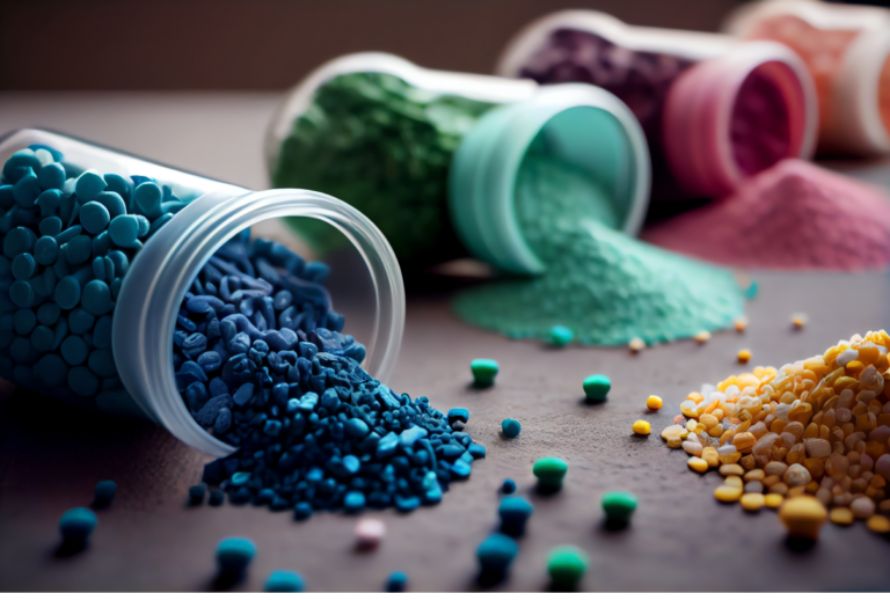 Plastic additives are chemical substances added to plastic to enhance properties
Plastic additives are chemical substances added to plastic to enhance properties
1.2 The categories of plastic additives
There are two main categories of plastic additives:
| Organic plastic additives |
Inorganic plastic additives |
- Derived from carbon-based compounds, enhance performance and properties.
- Examples include plasticizers for improved flexibility and resistance, and UV stabilizers for protection against UV degradation.
|
- Derived from non-carbon-based compounds, they improve mechanical and thermal properties.
- Examples include fillers like glass fibers or talc for increased strength and stiffness, and flame retardants for enhanced fire resistance.
|
Combining organic and inorganic additives offers the opportunity to achieve specific desired properties in plastic materials. Therein, the choice of additive depends on the desired outcome and the specific requirements of the application or industry.
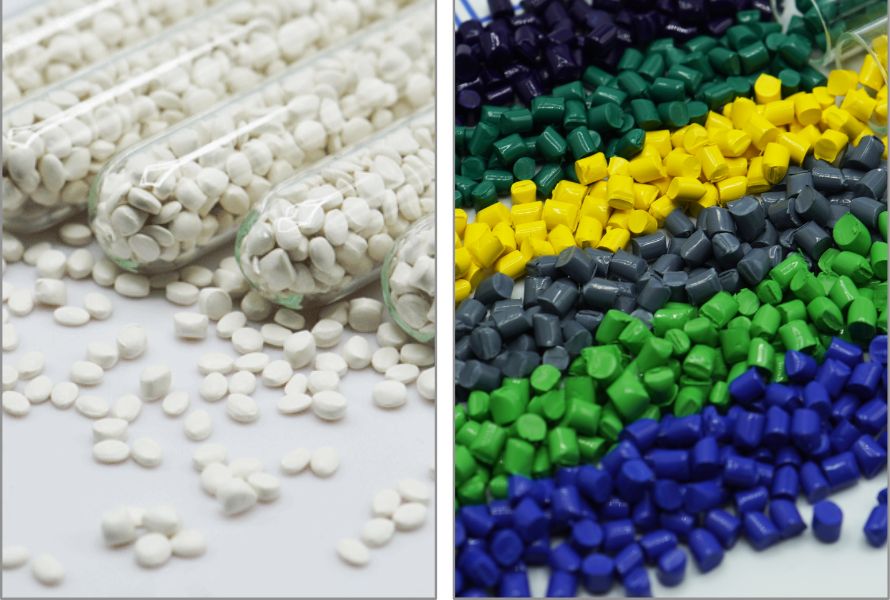 Organic additives improve flexibility and resistance while inorganic additives enhance mechanical properties
Organic additives improve flexibility and resistance while inorganic additives enhance mechanical properties
Read more: What are plastic additives? 8 most common plastic additives in plastic industry
2. The beneficial role of plastic additives in plastics industry
Plastic additives play a critical role in the plastics industry, offering a multitude of benefits that enhance the quality and functionality of plastic materials. Here are some key advantages:
2.1. Enhancing strength and rigidity
Plastic additives are used to enhance the strength and rigidity of plastic materials. For example, reinforcing fillers like glass fibers or carbon nanotubes can be added to improve the tensile strength and impact resistance of plastics. Additionally, additives like impact modifiers can enhance the toughness and durability of plastic products.
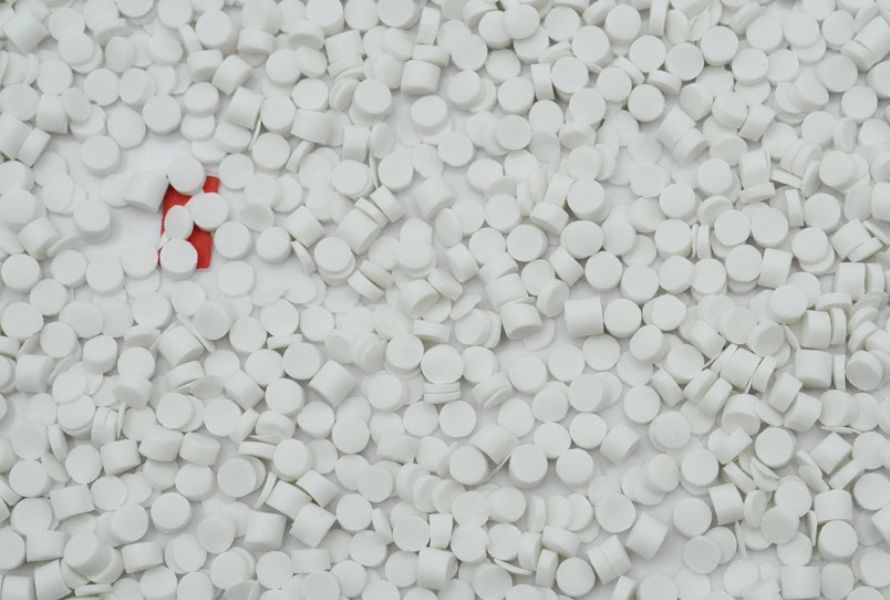 Plastic additives can be added to improve the tensile strength and impact resistance of plastics
Plastic additives can be added to improve the tensile strength and impact resistance of plastics
2.2. Improving flexibility
Plasticizers, one of plastic additives, are commonly used additives to improve the flexibility and versatility of plastic materials. By reducing intermolecular forces, plasticizers increase the mobility of polymer chains, allowing the plastic to bend, stretch, and deform more easily. This makes plastics suitable for applications requiring flexibility, such as vinyl flooring, flexible PVC pipes, and electrical cables.
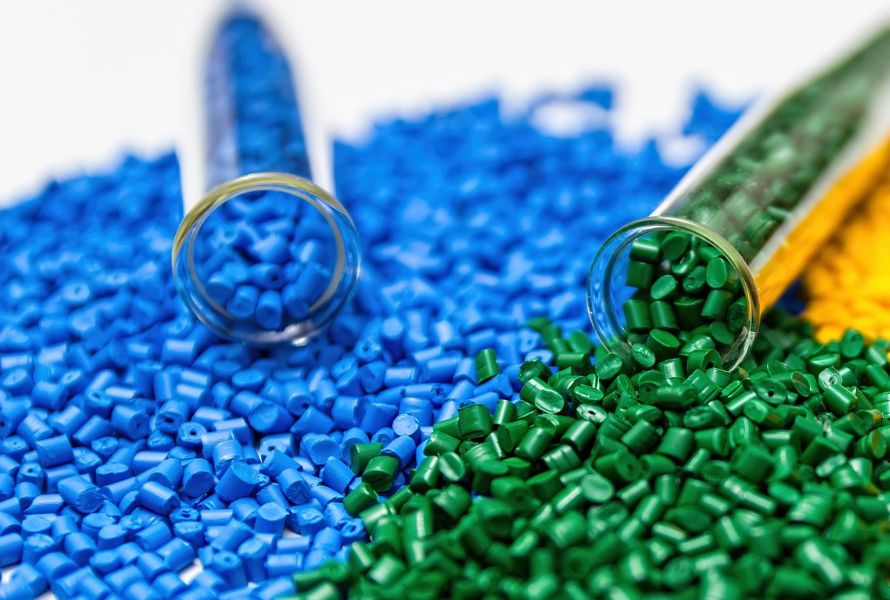 Plastic additives allow the plastic to bend, stretch, and deform more easily
Plastic additives allow the plastic to bend, stretch, and deform more easily
2.3. Enhancing thermal stability
Heat stabilizers are plastic additives that improve the thermal stability of plastics. They act by preventing the degradation of polymers at high temperatures, which can lead to discoloration, loss of mechanical properties, or even melting. Heat stabilizers are crucial in applications where plastics are exposed to elevated temperatures, such as automotive components or electrical enclosures.
2.4. Enhancing flame resistance
Plastic additives, particularly flame retardant, are included in plastics to improve their fire resistance. These additives work by suppressing or delaying the combustion process, reducing the spread of flames and smoke generation. Flame-retardant plastics find applications in various industries, including construction, electronics, and transportation, where fire safety is a priority.
2.5. Providing UV protection
UV stabilizers are added to plastics to protect them from the harmful effects of ultraviolet (UV) radiation. UV stabilizers absorb or scatter UV light, preventing it from degrading the polymer chains and causing discoloration, embrittlement, or loss of mechanical properties. Plastic additives with UV protection are commonly used in outdoor applications, such as automotive parts, outdoor furniture, or building materials.
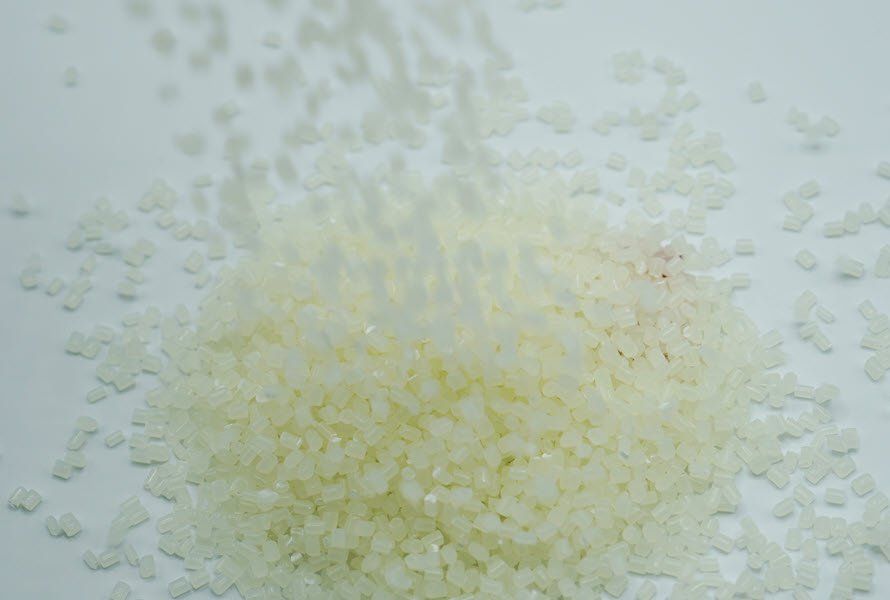 Plastic additives protect plastic from the harmful effects of (UV) radiation
Plastic additives protect plastic from the harmful effects of (UV) radiation
2.6. Modifying surface properties
Plastic additives can modify the surface properties of plastics to enhance their adhesion, hydrophobicity, or scratch resistance. For example, coupling agents are used to improve the bond between plastics and other materials in composite structures, while surface modifiers can make plastics more water-repellent or resistant to scratches and abrasion.
2.7. Improving electrical conductivity
Conductive plastic additives, such as carbon black or metallic particles, are used to impart electrical conductivity to plastics. These additives allow plastics to be used in applications where electrical conductivity is required, such as in electronic components, circuitry, or electrostatic discharge protection.
2.8. Reducing friction and wear
Lubricants and wear-resistant additives are used to reduce friction and wear in plastic components. These plastic additives create a lubricating layer between contacting surfaces, minimizing frictional forces and extending the lifespan of plastic parts. They are particularly important in applications where sliding or rotating movements occur, such as gears, bearings, or conveyor belts.
2.9. Ensuring product stability
Common plastic additives such as antioxidants and stabilizers are added to plastics to ensure their stability during processing, storage, and use. Antioxidants prevent the degradation of polymers caused by oxidation, while stabilizers protect against degradation from heat, light, or other environmental factors. These additives help maintain the physical and mechanical properties of plastics over time, ensuring their performance and longevity.
2.10. Enhancing color and appearance
Colorants are essential additives for achieving desired colors and appearances in plastic products. They can be added in different concentrations to create vibrant or subtle hues. Additionally, other plastic additives like UV stabilizers can be incorporated to protect the plastic from fading or discoloration caused by exposure to sunlight.
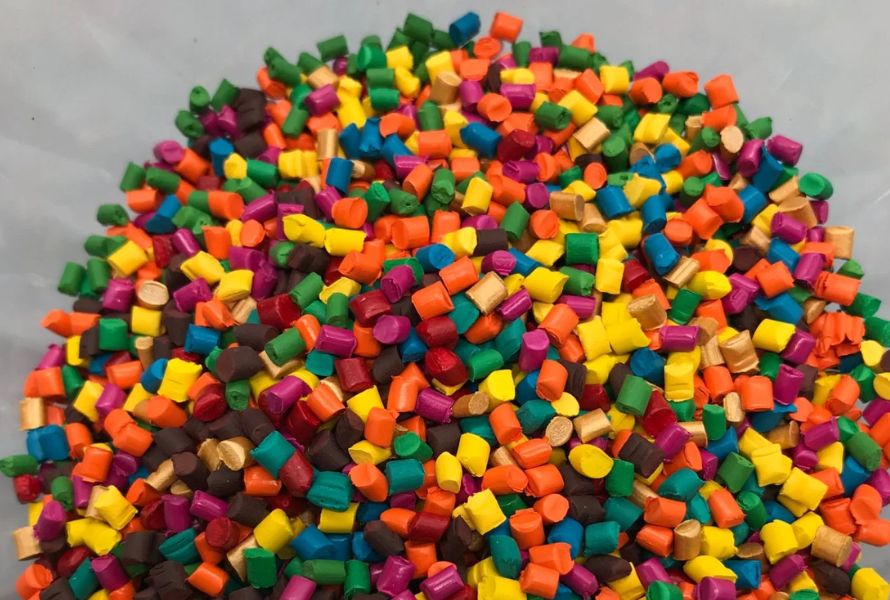 Plastic additives are necessary for achieving desired colors and appearances in plastic products
Plastic additives are necessary for achieving desired colors and appearances in plastic products
Read more: A Primer on Colorful Additives
3. Practical applications of plastic additives across industries in the plastics sector
Plastic additives play a crucial role in various industries within the plastics sector. The following are some examples of industries where plastic additives are widely utilized:
3.1. In packaging industry
Plastic additives are used to improve the performance and functionality of plastic packaging materials, ensuring durability, flexibility, and protection against degradation caused by heat, light, and oxidation.
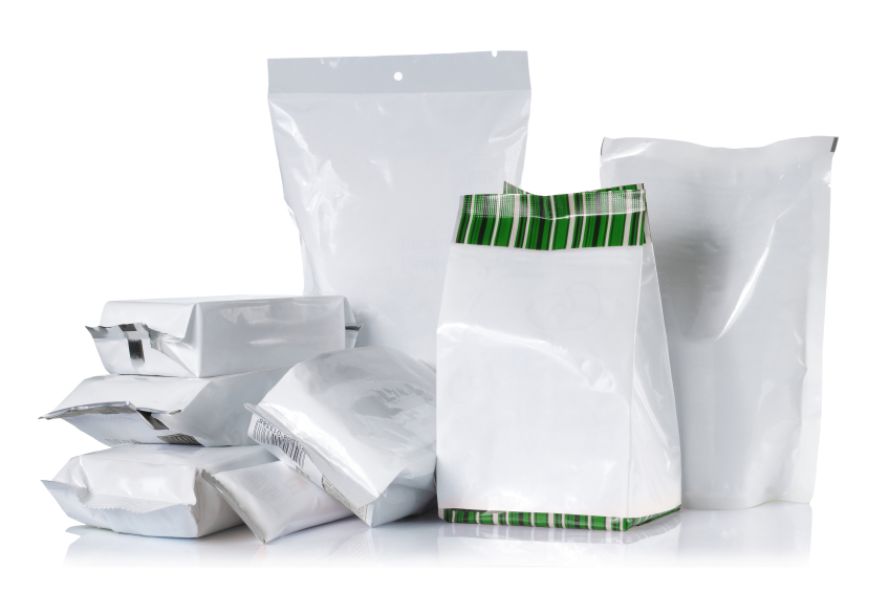 Plastic additives enhance the resistance of plastic packaging materials
Plastic additives enhance the resistance of plastic packaging materials
3.2. In automotive industry
Plastic additives play a crucial role in enhancing the performance and durability of plastic components used in vehicles, including flame retardants for safety compliance, fillers for strength and impact resistance, and UV stabilizers for protection against heat and UV radiation.
 Plastic additives improve the durability of plastic automotive parts
Plastic additives improve the durability of plastic automotive parts
3.3. In construction industry
In the construction sector, plastic additives are utilized to enhance the durability and weather resistance of plastic materials used in applications such as pipes, fittings, insulation, and roofing.
3.4. In electricity industry
Plastic additives find applications in the electronics industry for the manufacturing of casings, connectors, and circuit boards, providing properties like antistatic protection, flame retardancy, and resistance to heat and UV radiation.
3.5. In consumer good industry
Plastic additives are extensively used in the production of consumer goods such as toys, household appliances, and furniture to enhance aesthetics, flexibility, and longevity, while also providing protection against heat, oxidation, and UV degradation.
 Plastic additives ensuring product stability for consumer goods
Plastic additives ensuring product stability for consumer goods
4. Choose plastic additives at EuroPlas
EuroPlas is a renowned manufacturer of filler masterbatch and has earned a distinguished reputation in the industry with nearly 14 years of experience.
Building upon this success, we have diligently researched and developed our plastic additives to precisely meet the unique demands of our customers. Our extensive range of additives encompasses various solutions aimed at optimizing production processes, including:
- Anti-UV additives
- Anti-fog additives
- Anti-aging additives
- Processing-aid additives
- Anti-static additives
- Anti-blocking additives
- Flame retardant
- Deciccant
- Odor removing additives
At EuroPlas, we are committed to continuously expanding our offerings, ensuring that our customers have access to the most effective and tailored production solutions available. For more detailed information, please visit at Plastic additives | European Plastic JSC (europlas.com.vn).
5. Conclusion
Overall, plastic additives are essential for the plastics industry as they significantly improve the performance, durability, and safety of plastic materials. Moreover, Their wide range of beneficial features and applications across various industries within the plastics sector make them indispensable for shaping the industry.
Hope this reaches you well. For more information and consultation, please feel free to contact us HERE! Our team at EuroPlas is ready to assist you.